Fleurs du Mal Magazine


Or see the index
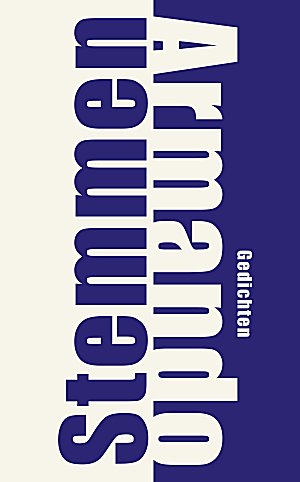
VPRO BOEKEN met Armando & Oek de Jong
zo 20 oktober 2013
De 84-jarige Armando beschouwt zijn werk als Gesamtkunstwerk: hij heeft theater, televisie, schilderijen, sculpturen, proza en poëzie gemaakt. Nu is daar zijn nieuwe gedichtenbundel Stemmen.
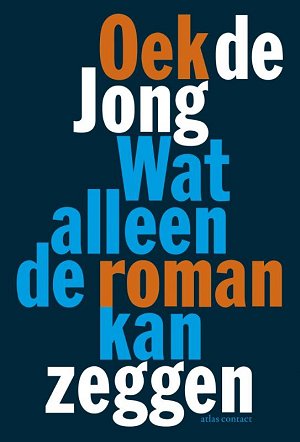
In Wat alleen de roman kan zeggen geeft schrijver Oek de Jong antwoord op de vraag: hoe kan de roman overleven in een tijd waarin hij met zoveel andere media moet concurreren? De Jong laat zien wat het unieke en onvervangbare is van de roman.
Deze aflevering wordt zondag uitgezonden, om 11.20 uur op Nederland 1
fleursdumal.nl magazine
More in: - Book News, Archive A-B, Archive I-J, Archive I-J, Armando, Art & Literature News
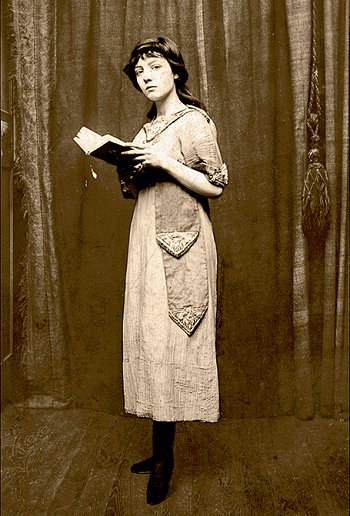
Mireille Havet
(1898-1932)
Le voyage
Hier, j’ai rencontré le voyage.
Il m’a dit bonjour. Il m’a dit : viens-tu ?
Son beau train flambant soufflait, sur les rails comme le cheval qui piaffe entre les rênes sûres.
Il m’a dit : regarde, le ciel lavé d’après les grêles d’avril est ouvert à la sortie du hall et voici déjà la campagne offrant les deux paumes de ses plaines, les longues sentes effilées de ses doigts accrochés aux forêts mitoyennes et ses ongles purs où sourit une étoile, qui sont les lacs, les fontaines, les abreuvoirs au seuil des fermes et la source jaillissante qui s’égrène entre la haie de crocus.
Va ! Prends la portière, ne consulte point d’indicateur, Toutes les heures sont belles et toutes les lignes sont bonnes… Si tu es un conquérant, il n’y a que le voyage !
Et je suis restée immobile et timide.
Le beau train dans la gare a sifflé… Son dernier wagon sur la voie qui tourne s’en est allé, tremblant comme un grelot noir.
Au retour, la ville me parut plus meurtrière encore. Je toussais le long de ses quais interminables. Enfant Prodigue qui avait refusé l’espace comme on renvoie un chien errant.
J’ai repris la routine des jours, l’oisiveté qui dévore plus que l’amour… Le grand licol de la ville baille autour de mon cou et cependant je n’ai pas su m’enfuir, craignant peut-être la solitude et la rencontre de mon âme que je veux croire perdue ?
Mais, au tournant de la rue, entre deux voitures qui se heurtaient, je l’ai rencontrée, mon âme. Elle sautait devant moi comme une petite fille folle et ses deux mains tremblantes se secouaient dans l’air. Elle avait cependant un tablier rosé… On aurait dit une meurtrière de huit ans. Comme j’allais l’atteindre, un camion m’en à séparée,… dès qu’il fut passé, je bondis, mais hélas je ne trouvai plus, planté dans l’herbe courte des Champs-Elysées, qu’un petit coquelicot maigre et ardent qui battait de la crête comme un petit coq malade.
Alors, je suis passée, prononçant des mots de tristesse vagues et mouvants comme des algues et qui se perdirent dans la rumeur de la ville, s’unissant au cri perpétuel de Paris qui nous enfarine, afin d’en poudrer son ciel clair, nos rêves les plus beaux, nos chairs les plus fines et nos désirs avortés d’univers.
Paris 1918
Revue Les Écrits Nouveaux Tome III – N°20 (Aout 1919)
Mireille Havet poetry
fleursdumal.nl magazine
More in: Archive G-H, Havet, Mireille, Mireille Havet
.jpg)
Kurt Tucholsky
(1890 – 1935)
Rosen auf den Weg gestreut
Musik: Hanns Eisler
Ihr müßt sie lieb und nett behandeln,
erschreckt sie nicht – sie sind so zart!
Ihr müßt sie Palmen sie umwandeln,
getreulich ihrer Eigenart!
Pfeift eierm Hunde, wenn er sie ankläfft:
küßt die Faschisten, wo ihr sie trefft!
Wenn sie in ihren Sälen hetzen,
sagt, “Ja und Amen – aber gern!
Hier habt ihr mich – schlagt mich in Fetzen!”
Und prügeln sie, so lobt den Herrn.
Denn Prügeln ist doch ihr Geschäft!
Küßt die Faschisten, wo ihr sie trefft!
Und schießen sie: du lieber Himmel,
schätzt ihr das Leben so hoch ein?
Das ist ein Pazifisten-Fimmel!
Wer möchte nicht gern Opfer sein?
Und spürt ihr auch in euerm Bauch
den Hitlerdolch, tief, bis zum Heft:
Küßt die Faschisten, wo ihr sie trefft!
fleursdumal.nl magazine
More in: Archive S-T, Tucholsky, Kurt
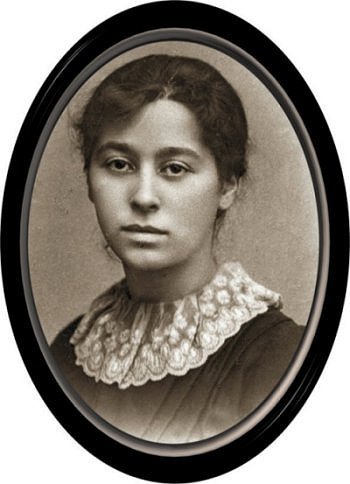
Amy Levy
(1861-1889)
Borderland
Am I waking, am I sleeping?
As the first faint dawn comes creeping
Thro’ the pane, I am aware
Of an unseen presence hovering,
Round, above, in the dusky air:
A downy bird, with an odorous wing,
That fans my forehead, and sheds perfume,
As sweet as love, as soft as death,
Drowsy-slow through the summer-gloom.
My heart in some dream-rapture saith,
It is she. Half in a swoon,
I spread my arms in slow delight.–
O prolong, prolong the night,
For the nights are short in June!
Amy Levy poetry
fleursdumal.nl magazine
More in: Amy Levy, Archive K-L, Levy, Amy
.jpg)
William Butler Yeats
(1865-1939)
Why Should Not Old Men Be Mad?
Why should not old men be mad?
Some have known a likely lad
That had a sound fly-fisher’s wrist
Turn to a drunken journalist;
A girl that knew all Dante once
Live to bear children to a dunce;
A Helen of social welfare dream,
Climb on a wagonette to scream.
Some think it a matter of course that chance
Should starve good men and bad advance,
That if their neighbours figured plain,
As though upon a lighted screen,
No single story would they find
Of an unbroken happy mind,
A finish worthy of the start.
Young men know nothing of this sort,
Observant old men know it well;
And when they know what old books tell
And that no better can be had,
Know why an old man should be mad.
.jpg)
W.B. Yeats poetry
fleursdumal.nl magazine
More in: Archive Y-Z, Yeats, William Butler


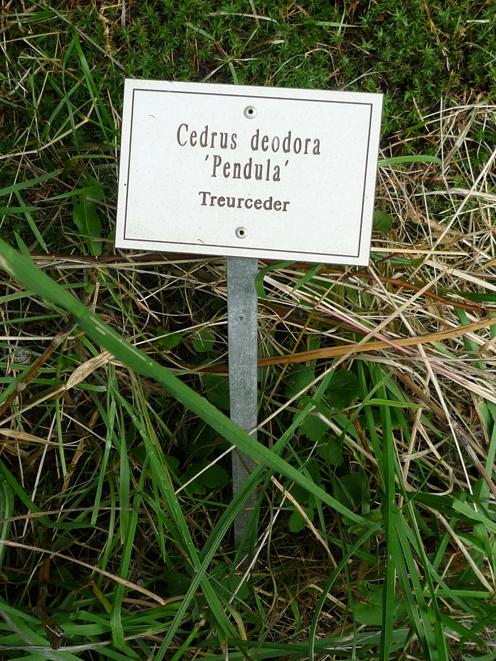
Guido Gezelle
(1830-1899)
uit: Laatste Verzen
Hebt toch meelye,
menschen, meelye
met de schoone
boomen Gods!
Foto’s: Freda Kamphuis©
fleursdumal.nl magazine
More in: Freda Kamphuis, Gezelle, Guido, Kamphuis, Freda
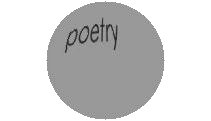
Presentatie dichtbundel Wreed het staren
Dichter Niels Landstra presenteert op 31 oktober 2013 zijn tweede gedichtenbundel ‘Wreed het staren’. Met de opvolger van zijn dichtbundel Waterval waarmee hij zijn succesvolle debuut als dichter maakte, schept hij met zijn bekende bloemrijke stijl opnieuw een sfeer van melancholie, humor en verwijdering. Uit de korte periode waarin hij nadien deze 28 gedichten heeft geschreven, blijkt zijn werkijver, maar laat hij ook zien dat hij bezig is zijn naam te vestigen in het Nederlandse en Vlaamse taallandschap. Met zijn optredens op talloze podia in den lande, waarbij hij zichzelf veelal muzikaal begeleidt of laat begeleiden, heeft hij dusdanig veel bekendheid gekregen, dat Wethouder Selçuk Akinci een eerste exemplaar van Werner Bartelds (uitgeverij Oorsprong) in ontvangst wil nemen. Gertjan Endedijk zal namens de Nieuwe Veste/Bibliotheek aanwezig zijn en Gert Groenendijk vertegenwoordigt het Breda’s Museum. Bovendien zal de avond worden voorzien van de nodige live-muziek en leest Niels Landstra, naast zijn werk uit zijn bundel, zijn nieuwe stadsgedicht voor met als titel: ‘Het oudste schilderij van Breda’, geïnspireerd door het gelijknamige schilderij uit 1518 dat onlangs is aangekocht door het Breda’s Museum.
Locatie: Hersbeek, St. Jansstraat 16, Breda. Aanvang 17 u.
fleursdumal.nl magazine
More in: Archive K-L, Landstra, Niels
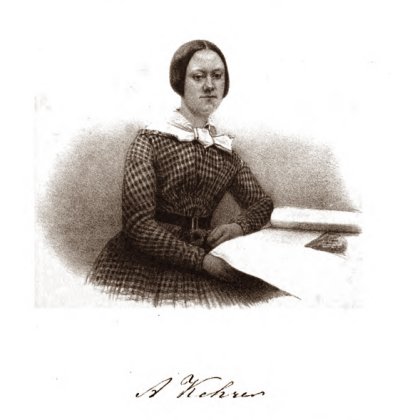
Albertine Kehrer
(1826-1852)
Zielzucht
Ver in ‘t verschiet ligt het doel van mijn zwerven,
Strijd en vermoeijing verwacht me op de baan;
Groot is mijn dagtaak nog, eer ik mag sterven,
En voor mij de ure der ruste zal slaan.
Ligt heeft Gods trouw mij nog droefheid en lijden –
Bittre geneesdrank der zielen – bereid;
Veel heb ik nog in zijn kracht te bestrijden,
Eer mij de vreugd des verwinnaars verbeidt.
Wel riep zijn Geest reeds een vonk in mij wakker
– Aanvang van ‘t hoogere leven der ziel -,
Ach maar hoe vaak nog verdringt in mijn akker
‘t Onkruid der zonde het zaad dat er viel!
‘k Voel nog zoo dikwerf de liefde me ontbreken,
d’IJver verkouden, ‘t geloove zoo klein!
‘k Zie dan de star van mijn vrede verbleeken,
‘k Weet mij zoo arm, zoo misvormd, zoo onrein!
Soms heft mijn ziel, op de wiek der gebeden,
Vurig en vrij zich omhoog tot haar God;
Bidt en ontvangt, voor zijn aanschijn getreden,
Kracht ter volbrenging van ‘t zwaarste gebod.
Ach, maar te ras trekt, met dubbele koorden,
‘t Werktuig van stof haar naar d’aard weer ter neer;
Nog wil zij bidden, maar ‘t faalt haar aan woorden,
Zuchten slechts heeft ze… Och! versta die, o Heer!
Ken en verhoor de ongesprokene bede
Let op de ziel die uw hulpe verwacht!
Och! deel de stroomen uws geestes mij mede!
Och! worde uw kracht in mijn zwakheid volbragt!
Leer me, onvermoeibaar, naar ‘t hoogste te streven,
Heilig te zijn als uw heilige Zoon!
Dat ik voor U in mijn hart en mijn leven
‘t Beeld van een burger des Hemels vertoon!
Zij dan het uur mijner rust nog verschoven,
Wacht mij nog arbeid en moeite op de baan:
‘k Hoop, onder wakend en biddend gelooven,
Vrolijk mijn reisweg ten einde te gaan!
Albertine Kehrer poetry
fleursdumal.nl magazine
More in: Albertine Kehrer, Archive K-L, Kehrer, Albertine

Man met regenscherm
Bij een tekening van Fernand Khnopff
Valt een bui. Langs hem heen. 1884.
Van hedendaags belang ontdaan is hier meneer
Edmond Picard slechts prachtig weggezette man
die een verzonnen zwezerik van kalf at, en volgens mij
dronk hij daarna nog lui wat bier.
Dat toch de wereld kaal is. Gedachte. Half op weg.
Zijn hoofd zit vol waardinnenboezem en potdicht
van de Wagnerdeunen. Hij is regenschermglad
van zin in meer. Heet wat zich daar vlak voor hem
in een plas legt nu nog schaduw of past in dit weer
een ander woord? Zwijgend als vermoord kijkt hij
schuw van alle leegte amper schamper
Bert Bevers gedichten
uit In de buurt van de wereld, Kleinood & Grootzeer, Bergen op Zoom, 2006
fleursdumal.nl magazine
More in: Archive A-B, Bevers, Bert

Marcel Proust
(1871-1922)
Anton Van Dyck
Douce fierté des coeurs, grâce noble des choses,
Qui brillent dans les yeux, les velours et les bois ;
Beau langage élevé du maintien et des poses
Héréditaire orgueil des femmes et des rois !
Tu triomphes, Van Dyck, prince des gestes calmes,
Dans tous les êtres beaux qui vont bientôt mourir,
Dans toute belle main qui sait encor s’ouvrir…
Sans s’en douter, qu’importe, elle te tend les palmes !
Halte de cavaliers sous les pins, près des flots
Calmes comme eux, comme eux bien proches des sanglots ;
Enfants royaux déjà magnifiques et graves,
Vêtements résignés, chapeaux à plumes braves,
Et bijoux en qui pleure, onde à travers les flammes,
L’amertume des pleurs dont sont pleines les âmes,
Trop hautaines pour les laisser monter aux yeux ;
Et toi par-dessus tous, promeneur précieux
En chemise bleu pâle, une main à la hanche,
Dans l’autre un fruit feuillu détaché de la branche,
Je rêve sans comprendre à ton geste et tes yeux :
Debout mais reposé dans cet obscur asile
Duc de Richmond, ô jeune sage ! – ou charmant fou ? –
Je te reviens toujours… -. Un saphir à ton cou
A des feux aussi doux que ton regard tranquille.
Marcel Proust poetry
fleursdumal.nl magazine
More in: Marcel Proust, Proust, Marcel
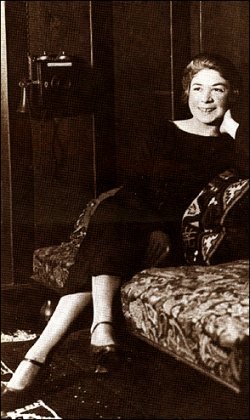
Alfonsina Storni
(1892-1938)
S i e s t a
Sobre la tierra seca
EI sol quemando cae:
Zumban los moscardones
Y las grietas se abren…
El viento no se mueve.
Desde la tierra sale
Un vaho como de horno;
Se abochorna la tarde
Y resopla cocida
Bajo el plomo del aire…
Ahogo, pesadez,
Cielo blanco; ni un ave.
Se oye un pequeño ruido:
Entre las pajas mueve
Su cuerpo amosaicado
Una larga serpiente.
Ondula con dulzura.
Por las piedras calientes
Se desliza, pesada,
Después de su banquete
De dulces y pequeños
Pájaros aflautados
Que le abultan el vientre.
Se enrosca poco a poco,
Muy pesada y muy blanda,
Poco a poco se duerme
Bajo la tarde blanca.
¿Hasta cuándo su sueño?
Ya no se escucha nada.
Larga siesta de víbora
Duerme también mi alma.
![]()
alfonsina storni poetry
fleursdumal.nl magazine
More in: Archive U-V, Storni, Alfonsina
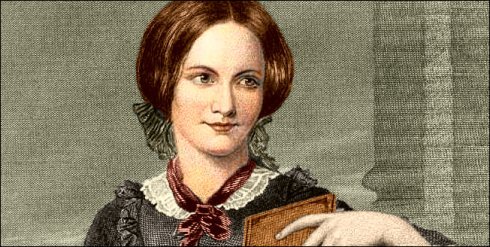
Charlotte Brontë
(1816–1855)
The Wood
But two miles more, and then we rest!
Well, there is still an hour of day,
And long the brightness of the West
Will light us on our devious way;
Sit then, awhile, here in this wood–
So total is the solitude,
We safely may delay.
These massive roots afford a seat,
Which seems for weary travellers made.
There rest. The air is soft and sweet
In this sequestered forest glade,
And there are scents of flowers around,
The evening dew draws from the ground;
How soothingly they spread!
Yes; I was tired, but not at heart;
No–that beats full of sweet content,
For now I have my natural part
Of action with adventure blent;
Cast forth on the wide world with thee,
And all my once waste energy
To weighty purpose bent.
Yet–sayst thou, spies around us roam,
Our aims are termed conspiracy?
Haply, no more our English home
An anchorage for us may be?
That there is risk our mutual blood
May redden in some lonely wood
The knife of treachery?
Sayst thou, that where we lodge each night,
In each lone farm, or lonelier hall
Of Norman Peer–ere morning light
Suspicion must as duly fall,
As day returns–such vigilance
Presides and watches over France,
Such rigour governs all?
I fear not, William; dost thou fear?
So that the knife does not divide,
It may be ever hovering near:
I could not tremble at thy side,
And strenuous love–like mine for thee–
Is buckler strong ‘gainst treachery,
And turns its stab aside.
I am resolved that thou shalt learn
To trust my strength as I trust thine;
I am resolved our souls shall burn
With equal, steady, mingling shine;
Part of the field is conquered now,
Our lives in the same channel flow,
Along the self-same line;
And while no groaning storm is heard,
Thou seem’st content it should be so,
But soon as comes a warning word
Of danger–straight thine anxious brow
Bends over me a mournful shade,
As doubting if my powers are made
To ford the floods of woe.
Know, then it is my spirit swells,
And drinks, with eager joy, the air
Of freedom–where at last it dwells,
Chartered, a common task to share
With thee, and then it stirs alert,
And pants to learn what menaced hurt
Demands for thee its care.
Remember, I have crossed the deep,
And stood with thee on deck, to gaze
On waves that rose in threatening heap,
While stagnant lay a heavy haze,
Dimly confusing sea with sky,
And baffling, even, the pilot’s eye,
Intent to thread the maze–
Of rocks, on Bretagne’s dangerous coast,
And find a way to steer our band
To the one point obscure, which lost,
Flung us, as victims, on the strand;–
All, elsewhere, gleamed the Gallic sword,
And not a wherry could be moored
Along the guarded land.
I feared not then–I fear not now;
The interest of each stirring scene
Wakes a new sense, a welcome glow,
In every nerve and bounding vein ;
Alike on turbid Channel sea,
Or in still wood of Normandy,
I feel as born again.
The rain descended that wild morn
When, anchoring in the cove at last,
Our band, all weary and forlorn
Ashore, like wave-worn sailors, cast–
Sought for a sheltering roof in vain,
And scarce could scanty food obtain
To break their morning fast.
Thou didst thy crust with me divide,
Thou didst thy cloak around me fold;
And, sitting silent by thy side,
I ate the bread in peace untold:
Given kindly from thy hand, ’twas sweet
As costly fare or princely treat
On royal plate of gold.
Sharp blew the sleet upon my face,
And, rising wild, the gusty wind
Drove on those thundering waves apace,
Our crew so late had left behind;
But, spite of frozen shower and storm,
So close to thee, my heart beat warm,
And tranquil slept my mind.
So now–nor foot-sore nor opprest
With walking all this August day,
I taste a heaven in this brief rest,
This gipsy-halt beside the way.
England’s wild flowers are fair to view,
Like balm is England’s summer dew
Like gold her sunset ray.
But the white violets, growing here,
Are sweeter than I yet have seen,
And ne’er did dew so pure and clear
Distil on forest mosses green,
As now, called forth by summer heat,
Perfumes our cool and fresh retreat–
These fragrant limes between.
That sunset! Look beneath the boughs,
Over the copse–beyond the hills;
How soft, yet deep and warm it glows,
And heaven with rich suffusion fills;
With hues where still the opal’s tint,
Its gleam of prisoned fire is blent,
Where flame through azure thrills!
Depart we now–for fast will fade
That solemn splendour of decline,
And deep must be the after-shade
As stars alone to-night will shine;
No moon is destined–pale–to gaze
On such a day’s vast Phoenix blaze,
A day in fires decayed!
There–hand-in-hand we tread again
The mazes of this varying wood,
And soon, amid a cultured plain,
Girt in with fertile solitude,
We shall our resting-place descry,
Marked by one roof-tree, towering high
Above a farmstead rude.
Refreshed, erelong, with rustic fare,
We’ll seek a couch of dreamless ease;
Courage will guard thy heart from fear,
And Love give mine divinest peace:
To-morrow brings more dangerous toil,
And through its conflict and turmoil
We’ll pass, as God shall please.
.jpg)
Currer Bell (Charlotte Brontë) poetry
fleursdumal.nl magazine
More in: Anne, Emily & Charlotte Brontë, Brontë, Anne, Emily & Charlotte
Thank you for reading Fleurs du Mal - magazine for art & literature